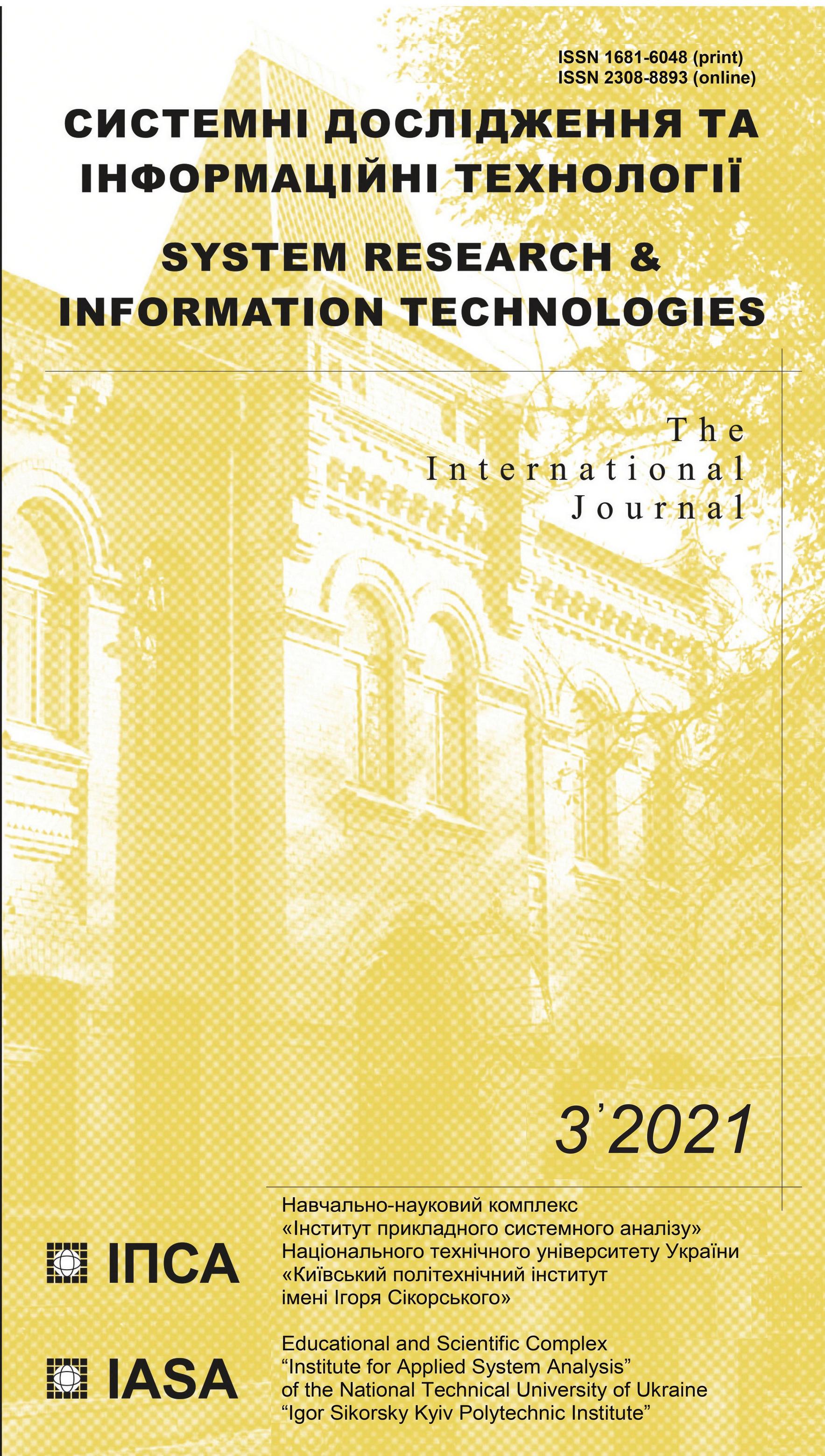Cognitive modeling of informatization influence on socio-economic indicators of the region
DOI:
https://doi.org/10.20535/SRIT.2308-8893.2021.3.06Keywords:
complex systems, research, cognitive simulation, region, information and communication technologiesAbstract
The article discusses topical issues of the influence of informatization on the development of the country’s regions in the conditions of the modern unstable world. The nature of the development of a region can be reflected and understood on the basis of qualitative and quantitative information about its socio-economic indicators, about their relationship and trends in their changes under the influence of internal and external factors. At the same time, information can most often be incomplete, difficult to access, untimely, contradictory, etc. Therefore, in this paper, it is proposed to use a cognitive approach and cognitive modeling of complex systems to overcome the problems of information deficiency by imitating cognitive modeling of the structure and behavior of a complex regional system. The simulation was carried out using the author’s CMCS (Cognitive Modeling Complex System) software system. The results of multi-stage cognitive modeling, consisting in the development of cognitive maps “Influence of ICT on the state of the region” and “Digitalization of the republic” (according to the socio-economic state of the Republic of Dagestan), analysis of structural properties and modeling scenarios for the development of situations on the model are presented. Scenarios make it possible to foresee the ways of possible development of the system under the influence of various factors, including the factor of informatization.
References
N.A. Abramova and Z.K. Avdeeva, “Cognitive analysis and management of the development of situations: problems of methodology, theory and practice”, Problems of management, no. 3, pp. 85–87, 2008.
Z.K. Avdeeva, S.V. Kovriga, D.I. Makarenko, and V.I. Maksimov, “Cognitive approach to management”, Management problems, no. 3, pp. 2–8, 2007.
R.M. Axelrod, The Structure of decision: The Cognitive Maps of Political Elites. Princeton, NJ, Princeton University Press, 1976, 404 p.
R.H. Atkin, Combinatorial connectives in social systems. An application of simplicial complex structures to the study of large organizations, Interdisciplinary systems research. Springer Basel AG, 1997, 245 p.
R. Atkin and J.L. Casti, “Polyhedral Dynamics and the Geometry of Systems”, IIASA Research Report RR-77-006, 1977.
H. Barcelo, X. Kramer, R. Laubenbacher, and C. Weaver, Foundations of Connectivity Theory for Simplicial Complexes. Department of Mathematical Sciense, New Mexico, 1998.
J. Casti, Connectivity, Complexity, and Catastrophe in Large-scale Systems. A Wiley – Interscience Publication International Institute for Applied Systems Analysis. JOHN WILEY and SONS. Chichester–New York–Brisbane–Toronto, 1979, 203 p.
J.L. Casti, “Polyhedral Dynamics – II: Geometrical Structure as a Basis for Decision Making in Complex Systems”, IIASA Research Memorandum RM-75-034, 1975.
J.L. Casti and A. Karlqvist, Complexity, Language, and Life: Mathematical Approaches. Springer-Verlag (Heidelberg), 1985.
C. Eden, “Cognitive mapping”, European Journal of Operational Research, no. 36, pp. 1–13, 1998.
G.V. Gorelova, E.N. Zaharova, and C.A. Radchenko, Researches of semi-structured problems for social-economical systems: Cognitive approach. Rostov: RGY, 2006.
G.V. Gorelova, “Intellectual Cognitive Technologies for Cyber-Physical Systems”, Lecture Notes in Networks and Systems, 95, pp. 617–631, 2020.
G.V. Gorelova and N.D. Pankratova, “Scientific Foresight and Cognitive Modeling of Socio-Economic Systems”, IFAC PAPERSONLINE, vol. 51, iss. 30, pp. 145–149, 2018.
G.V. Gorelova and A.A. Saak, "Scenario cognitive modeling of development trends of the complexity system "Youth, Labor Market, Quality of Life", System Research and Information Technologies, Scientific and Technical Journal, no. 1, pp. 103–121, 2021.
Innovative development of socio-economic systems based on foresight and cognitive modeling methodologies. Collective monograph; ed. G.V. Gorelova, N.D. Pankratova. Kiev: Naukova Dumka, 2015, 464 p.
T. Kasimova, S. Magomedova, and Z. Ismikhanov, “Econometric models for Russia’s GDP analysis and forecasting in the industrial section of the economy in conditions of its digital transformation”, Journal of the Knowledge Economy, 2020.
L.J. Hettinger, A. Kirlik, Y.M. Goh, and P. Buckle, “Modelling and simulation of complex sociotechnical systems: envisioning and analyzing work environments”, Ergonomics, 58(4), pp. 600–614, Apr 2015.
A.Kh. Karanashev and A.G. Karasheva, “Cognitive modeling of the investment climate of the Kabardino-Balkarian Republic”, Bulletin of the Adyghe State University. Series 5: Economics, no. 2 (180), pp. 129–137, 2016.
S.V. Kovriga, “Methodological and analytical foundations of the cognitive approach to SWOT-analysis”, Management problems, no. 5, pp. 58–63, 2005.
V.V. Kulba, D.A. Kononov, S.S. Kovalevsky, S.A. Kosyachenko, R.M. Nizhegorodtsev, and I.V. Chernov, Scenario analysis of the dynamics of the behavior of socio-economic systems (Scientific edition). M.: IPU RAN, 2002, 122 p.
P. Langley, J.E. Laird, and S. Rogers, “Cognitive architectures: Research issues and challenges”, Cognitive Systems Research, vol.10, no. 2, pp. 141–160, 2009.
V.I. Maksimov, “Cognitive technology – from ignorance to understanding”, Sat. Proceedings 1st International Conference “Cognitive analysis and development management situations”, (SASC’2001), Moscow: IPU RAN, 2001, vol.1, pp. 4–18.
L.G. Matveyeva, Ye.V. Mikhalkina, and O.A. Chernova, “The possibilities of the Russian regions capacity increasing under the external threats”, Economy of Region, no. 1 (41), pp. 96–104, 2015. doi: 10.17059/2015-1-9.
Program for cognitive modeling and analysis of socio-economic systems at the regional level. Certificate of state registration of computer programs No. 2018661506 dated 09/07/2018.
F.S. Roberts, Discrete mathematical models with application to social, biological and environmental problems. Prentice-Hall, Inc. Englewood Cliffs, New Jersey, 1976, 496 p.
F.S. Roberts, Graph Theory and its Applications to Problems of Society, Society for Industrial and Applied Mathematics. Philadelphia, 1978.

